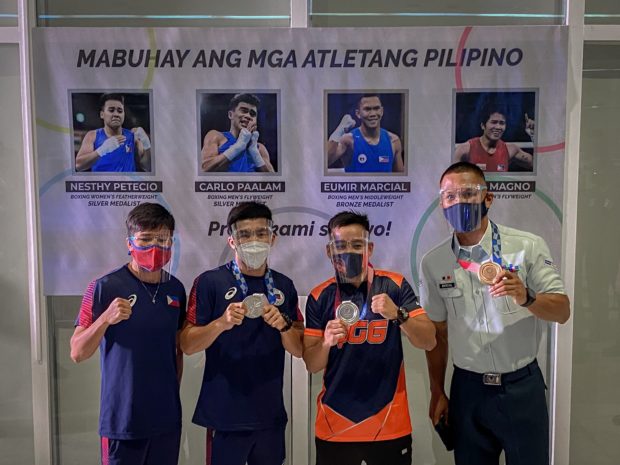Olympians back home, get honors from gov’t
President Duterte on Monday met via videoconferencing with four of the country’s boxers who participated in the Tokyo Olympics, three of whom brought home medals—two silvers and a bronze.
“It is not an everyday occurrence that we receive such an honor from our citizens of the Republic of the Philippines. You went to Tokyo to fight and I say that you did your best and the Filipino people appreciate it, especially [for your] bringing honor to the country,” Mr. Duterte said.
“Go home to your provinces and share your glory with your friends and family,” he told Carlo Paalam, Nesthy Petecio, Eumir Marcial and Irish Magno.
The President said that in addition to the incentives under the law, his office would give P2 million each to Paalam and Petecio, who bagged silver medals, and P1 million to Marcial, who won a bronze.
“You can already get married. You already have the money for it,” Mr. Duterte said in jest.
The medalists would also receive the Order of Lapu-Lapu for bringing honor to the country, he added. As for the other athletes who were part of the Olympic delegation, they would get P200,000 each in addition to a presidential citation.
Partial credit
In a briefing earlier in the day, Malacañang took some of the credit for the country’s best showing so far in the Olympics. In addition to the two silver and one bronze medals, the Philippines also bagged its first gold through weightlifter Hidilyn Diaz.
Even as presidential spokesperson Harry Roque thanked the athletes, their coaches, trainers and mentors for their performance, he pointed out that it was not a coincidence the Philippines got its first gold medal under Mr. Duterte.
“The figures will bear me out. Our President really invested in our athletes. For the first time, we gave record financial support to our athletes and we have seen the fruits of such an investment,” he said.
Of the Philippine Sports Commission’s 2020 budget allocation of P945 million, P500 million was for the preparation and training of athletes for the Tokyo Olympics and Asean Para games.
The commission had a much bigger budget of P5.36 billion in 2019 but the bulk of it, or P5 billion, was for the country’s hosting of the Southeast Asian Games while P100 million was allotted for the training and preparation of local athletes.
Despite the big allocations, Diaz posted on social media in 2019 an appeal for financial support from the private sector to achieve her goal of winning a gold medal in the Olympics. This was after the Palace included her in a matrix of people supposedly plotting to oust the President.
Shortly after Diaz’s win, Roque had also acknowledged that athletes do not receive enough financial support from the government and likened their allowances to minimum wages.
At the House of Representatives, the “Hidilyn Diaz bill” exempting “from any and all taxes” the incentives, rewards and bonuses given to national athletes and their coaches who win in international sports competitions is a step closer to becoming a law.
The ways and means committee on Monday approved the substitute bill that consolidated four measures and seeks to amend Republic Act No. 10699, or the National Athletes and Coaches Benefits and Incentives Act.
It proposes that rewards, bonuses and other forms of emoluments for national athletes and coaches who join or win in international sports competitions be exempted from all taxes, fees and charges.
It also provides that donations for incentives and rewards “be considered as allowable deductions from gross income for purposes of computing the taxable income of the donor.”
The bill will cover all the bonuses and other rewards given to Diaz and the other athletes and coaches who won medals in the Olympics.
It took less than two weeks for the House panel to consolidate and approve the substitute measure which will now undergo plenary deliberations.
It is expected to be speedily approved on second and third reading as a measure principally sponsored by Speaker Lord Allan Velasco.
